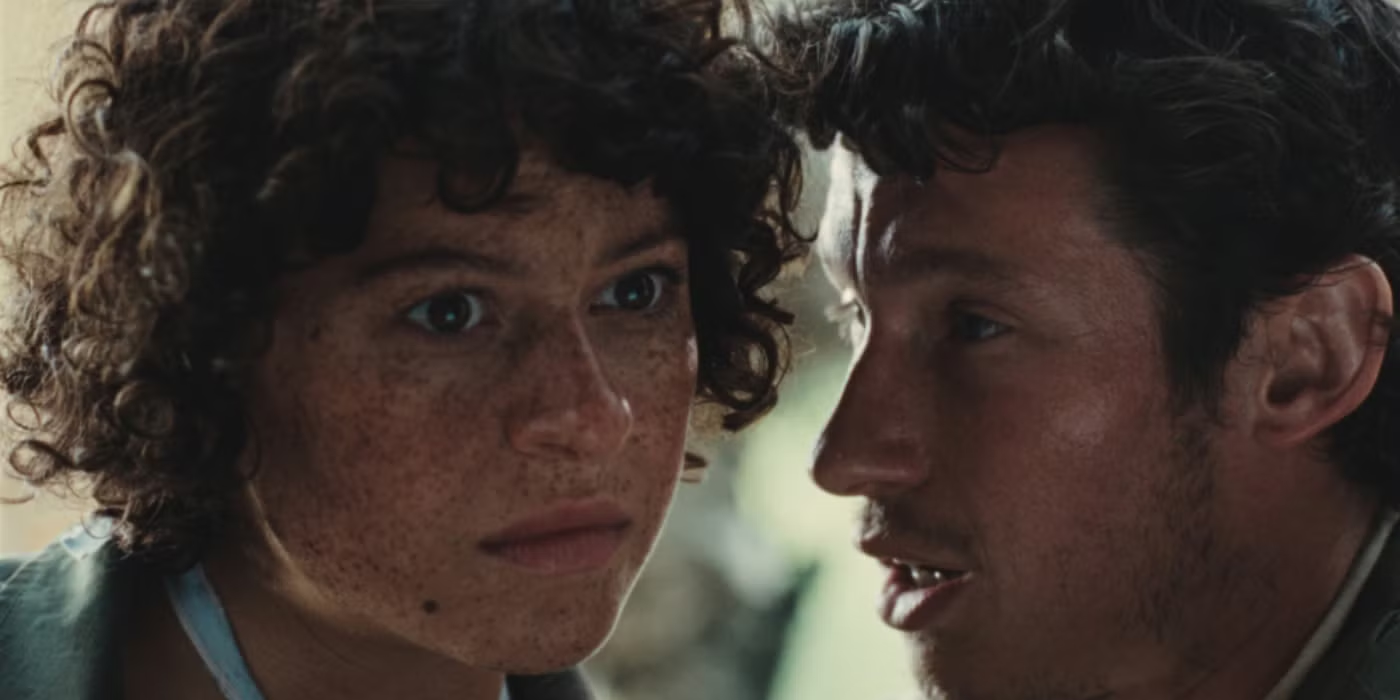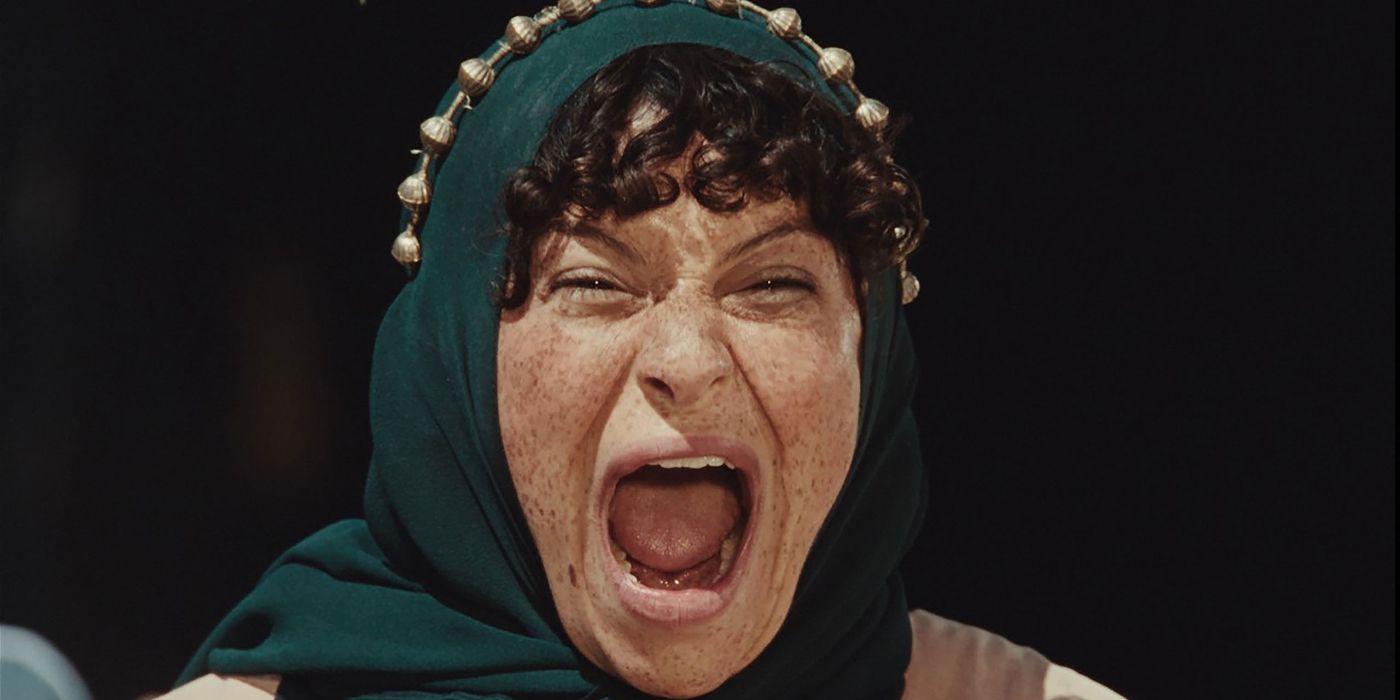
In the movie Atropia, Hailey Gates’ intense and disquieting first feature film, there comes a scene where Alia Shawkat, playing her part with sharp accuracy, seemingly enters a battlefield in progress. The camera work adheres to the common themes of contemporary war movies: it shakes, the colors are subdued like a desert landscape, and there’s an unsettling silence before an expected blast. However, things start to feel off. A fake donkey is seen upfront. The gunfire seems contrived. Suddenly, someone yells in English, but their accent is exaggerated, as if an actor was reciting lines that were difficult for them to comprehend.
Without warning, the facade crumbles. It’s not a battlefield—it’s Atropia, an artificial city engineered for military drills. Here, performers enact conflicts to be repeated, shaping American soldiers for a war that has been scripted, sterilized, and tailored to their comprehension. In essence, this is the stage of war, witty, self-referential, and painfully ironic.
Empathy Is Optional in ‘Atropia’
Shawkat’s character, a struggling actress, accepts a part in Atropia not because she shares the cause, but for financial reasons – it’s an industry that persistently casts her in stereotypes. In this setting, she, along with many others, is participating in a war simulation meant to ready soldiers. However, how effective can this preparation be when even those hired to portray Iraqi civilians don’t resonate with the culture they are supposed to depict? During a sharp dialogue, an Iraqi extra repeats a worn-out stereotype about the people he is paid to represent, turning them into cartoons instead of acknowledging their humanity. Given that even the performers are influenced by the same prejudices, how can this training foster genuine comprehension? The whole process appears staged; empathy is optional.
In a peculiar setting, Atropia mirrors an unrealistic training ground. Here, genuine military operations intertwine effortlessly with scenes reminiscent of Hollywood productions. Soldiers train for counterinsurgency, while actors prepare for staged battles meant for media consumption. Chloë Sevigny and Tim Heidecker portray the leaders of a mysterious corporation that thrive off the continuous cycle of war simulations. This America seems to not only engage in warfare but also rehearse, promote, and commercialize it. The most incisive line from Chloe Sevigny’s character in a corporate video serves as a chilling reminder of this reality: “Generate conformity by creating issues that only you can resolve.” It has been close to two decades since the Iraq War, yet this philosophy remains the cornerstone of America’s strategy for both domestic and foreign affairs.
The movie skillfully blends criticism with poignant human scenes, such as Callum Turner’s portrayal of a soldier tormented by his genuine experiences in Iraq. In one particularly disturbing scene, his recollections intrude on the present, seamlessly transitioning from past combat footage to the visages of innocent Iraqi civilians caught up in the turmoil. This juxtaposition between authentic warfare and simulated war creates the film’s main tension, a theme that persistently emerges throughout Turner’s character development: when does training turn into propaganda?
A Simulacrum of Conflict: War Games as Method Acting

The title and fictional city, “Atropia,” serve as an expansive movie set mimicking a Middle Eastern village, used by American troops to rehearse counterinsurgency tactics. Here, actors, often immigrants or second-generation Americans, portray civilians, insurgents, and informants in simulated skirmishes. The military employs these performers to depict stereotypes considered crucial for their training.
The irony of the situation—of observing staged wars, already concluded, renamed, and repackaged—mirrors the irony of a nation perpetually reshaping its own stories to align with its international aspirations.
One striking symbolic element in the movie is the emphasis on safeguarding a rare desert tortoise, which must never be disturbed due to its endangered status. This seemingly trivial aspect mirrors the internal conflicts within America – while one area focuses on shaping soldiers for war, another zealously defends wildlife at any cost, sometimes impeding soldier training efficiency. The tortoise serves as a representation of the internal discord within America, illustrating how its priorities are divided between militarization and conservation, preservation and demolition, peace and bureaucracy.
Given her diverse background in acting, modeling, and journalism at Vice, Gates is exceptionally qualified to narrate such a tale. Her work, Atropia, lies at the crossroads of dramatic art, media analysis, and investigative reporting, scrutinizing the ambiguous boundaries between acting, news coverage, and propaganda. As someone who has been involved in various aspects of performance, Gates recognizes that cultures such as Hollywood, journalism, and even the military are constructed on predetermined narratives. In her perspective, war is no exception; it is rehearsed, staged, and continuously performed for audiences accustomed to consuming it like entertainment.
The Romance of War and the Illusion of Escape

Furthermore, we have a love story unfolding – an intriguing turn of events within a war-themed romantic comedy satire. Alia Shawkat’s character, a captivating and heavily pregnant actress portraying an Iraqi villager, becomes embroiled with Callum Turner’s character, a battle-hardened veteran. As he has been thrust into combat from a tender age, he has never truly grasped the ways of civilian life, and even in Atropia – where war is merely a facade – he finds solace in the routine it offers.
The relationship between his character and Shawkat’s is both authentic and staged, made complex by the fact that she also portrays a character. Despite their developing feelings for each other, there’s an irony: the Iraqi villager he adores is merely another American actor, trapped in the same fictional war narrative, enacting the same myth. Atropia boldly ventures into unpredictable territory, combining absurdity with heartfelt sincerity, implying that even within a simulated battlefield, genuine feelings and true connections might emerge – or are they merely illusions?
The heart of the movie lies in the bond between Shawkat’s character and Tony Shawkat, who plays the Iraqi cultural coordinator/Mayor of Atropia. He is among the rare individuals in Atropia who perceives the entire operation for what it truly is—a training ground for our teenagers to carry out bombings on our homeland. In stark contrast to the detachment surrounding them, he declares this truth plainly. He is the only character who shows genuine concern about Shawkat’s role in these events, as he recognizes that even in preparation, war is never just a game.
In one of the movie’s most awe-inspiring scenes, Shawkat and Turner’s characters flee to Las Vegas – a destination that symbolizes seeking something extraordinary, given its design to mimic beauty from various parts of the world. The film is riddled with such ironic instances, reflecting America’s fascination with simulated realities. When authentic experiences are lacking, we create substitutes. When genuine justice eludes us, we contrive it. When true conflict is absent, we rehearse it until it seems authentic.
A Satire for a Country That No Longer Knows What’s Real
The film “Atropia” skillfully blends satire with genuine emotion, finding humor in the ridiculousness of conflict without dismissing its serious impacts. It explores the portrayal of power, the commercialization of strife, and how America perpetually markets war – not just to other nations, but also internally. The final scene, which I won’t reveal, masterfully connects the narrative, suggesting that Atropia is more than a location; it’s an idea – one that can be replicated, repackaged, and resold for any adversary, in any conflict. As the credits conclude, one can’t help but wonder: If war is a commodity, then who, precisely, is the buyer?
Hailey Gates has crafted an exceptional piece – not just poking fun, but delving deep with a critique. Instead of focusing on traditional battlefields, her work, titled “Atropia“, portrays war in 2025 as less about physical conflicts and more about the stories we tell. In this production, every character is an actor, some simply earn more than others.
Read More
- 10 Most Anticipated Anime of 2025
- Pi Network (PI) Price Prediction for 2025
- USD MXN PREDICTION
- Silver Rate Forecast
- USD CNY PREDICTION
- Brent Oil Forecast
- How to Watch 2025 NBA Draft Live Online Without Cable
- Gold Rate Forecast
- USD JPY PREDICTION
- PUBG Mobile heads back to Riyadh for EWC 2025
2025-02-02 06:03